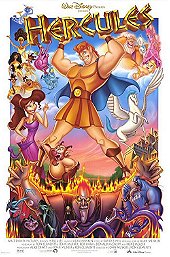Doing to Greek mythology what the studio has long done to Grimm’s fairy tales, Hercules takes a few names and recasts them into an original story. Strange that instead of leaning into the mythic, operatic workings of the original story, Disney is happier to play it all as laughs. Doesn’t mean it’s bad, it’s very fun and very funny, but it’s the slightest film of the Renaissance since The Rescuers Down Under.
It’s easier to see Disney re-crafting the pieces of the story into something happier, the original Greek myth goes dark but still ends with Hercules regaining his immortality. Yet other choices have always bothered me. This film came out when I was ten, and in the middle of an obsession with learning all about the Greek myths so I was wildly looking forward to it. I’ve always enjoyed it, but my appreciation for it has always been somewhat complicated.
Hades never seemed like the obvious choice for a villain, and he remains somewhat unsatisfying. Turning Zeus and Hera into a functional couple, and Zeus a goofy loving dad type is just strange. Some of the natural drama and psychological complexity has been cut off at the knee. Any depth in Hercules comes purely from Megara, who is one of the most pleasing leading ladies to come across in some time. Even then, so much of the film has played for slapstick, laughs, satire, and low-stakes that its third act rush for some depth feels somehow unearned.
Very little territory is mined from the father-son dynamics, and the romance between Hercules and Megara is rushed, to say the least, so her about-face feels like the plot mechanics loudly whirring by instead of an organic growth of their relationship. Where Hercules shines is as a satire of merchandising blitzes, overnight stardom, and pop culture references. This is probably as close to eating its own tail as Disney will ever get.
Yes, there’s something self-aware about Hercules in these moments. With the opening narration of Charlton Heston, Ben-Hur himself, something of a pointed tongue-in-cheek nod to where we’re headed. He then hands off the narration to a literal Greek chorus, the Muses, who complain that he was making the story sound more dramatic and tragic than it really is. The Muses are the brightest spot in Hercules, even when the film gets flabby or weird, they swoop up in with a gospel-tinged musical number to liven up the proceedings.
Hercules actually has a stronger cast of female characters than male ones. Granted, Hera is rendered practically mute, but Megara and the Muses are far more memorable than the dumb-but-sweet hero. Their duet, “I Won’t Say (I’m in Love),” rekindles some of the group harmonies and old-fashioned pop brilliance of The Little Mermaid’s “Kiss the Girl.” Oh, Megara, how I love your sardonic nature. She’s like Barbara Stanwyck in The Lady Eve to Hercules’ Henry Fonda. She could probably do better than this guy, but what he lacks in brains he makes up for in heart and tenderness. So I guess she could do much worse.
When you scrub out the sexuality from Greek mythology, what you’re left with is a lot of violence. Hercules doesn’t shy away from showing him beating up or killing various foes. The battle with the hydra is memorable, but the finale is even better. The rolling fat and jiggly bits of the Cyclops as he takes on Hercules are hypnotic to watch. I mean this as a compliment, as the animators have created a fluidity of movement with the character that is almost graceful. In fact, I found all of the Titans to be among some of the best animation the studio has produced during the Renaissance. They’re strange, frightening creations that tower so large they can’t be contained within the frame. Shame that they last for so brief a time in the film.
Perhaps that’s another problem with Hercules, as there’s a bounty of odd creatures and gorgeous sets to visit, and the film tries to cram them all in. The Underworld is appropriately atmospheric and creepy, with the large looming skull, river of souls, and a Cerberus that is truly menacing looking. Mount Olympus doesn’t do as well in this translation, as it is all swirling clouds and nothing more. Frankly, I’d rather hang out in the Underworld. And the trials of Hercules make a brief appearances – there’s a centaur, a caged bird, a lion (Scar in a cameo), mentions of the Amazons and the stables – but aside from one or two, nothing much is done with them.
This is probably my biggest frustration with Hercules. Yes, it's funny and charming, and I find the art direction to be stellar, it borrows liberally from Greek vase painting to create an interesting new wrinkle in Disney's house style; yet, it doesn't engage with the source material in any meaningful way. It is, in fact, highly entertaining, but it's a comedown from the lofty ambitions of the three prior films, regardless of their quality.
 Login
Login